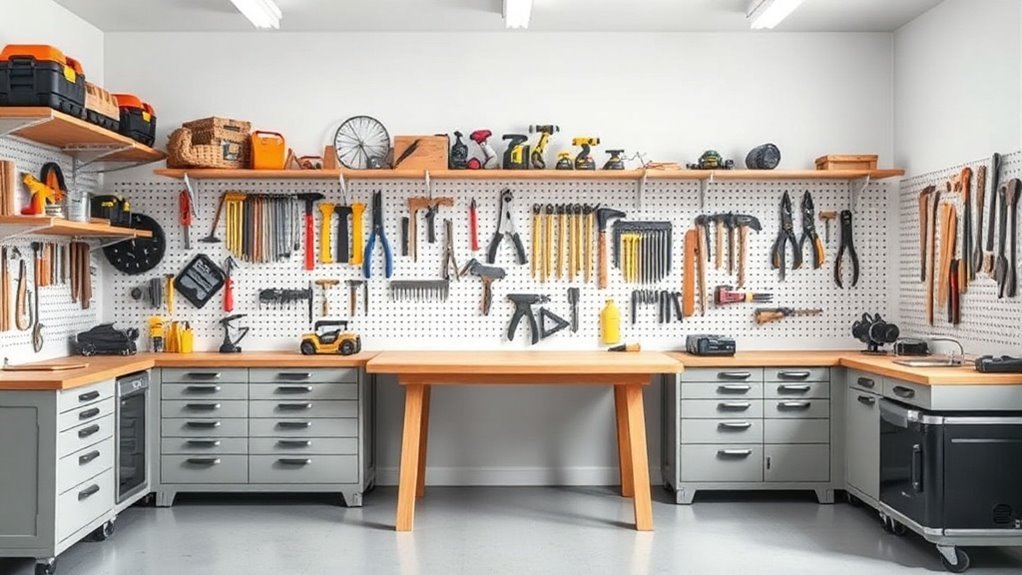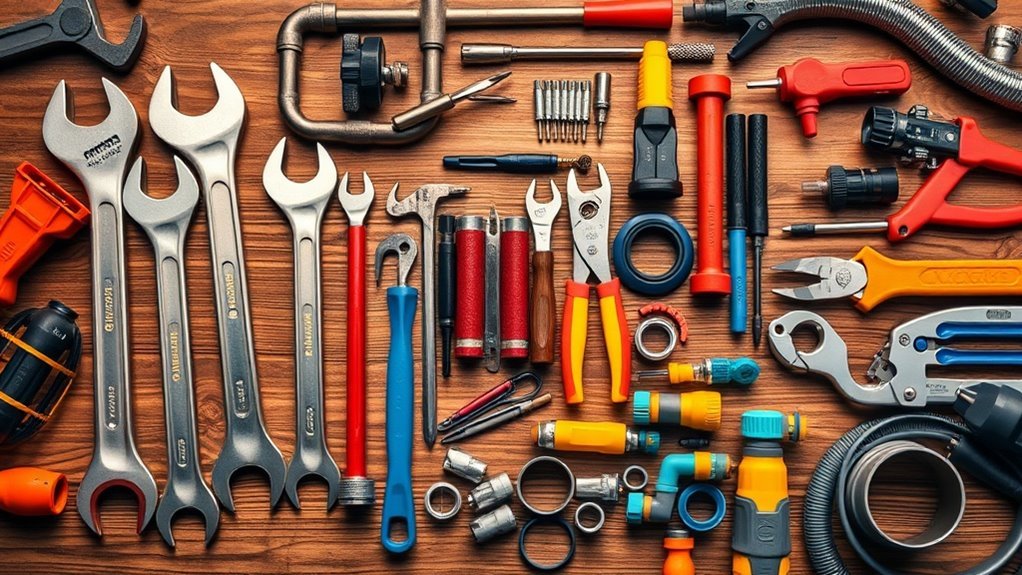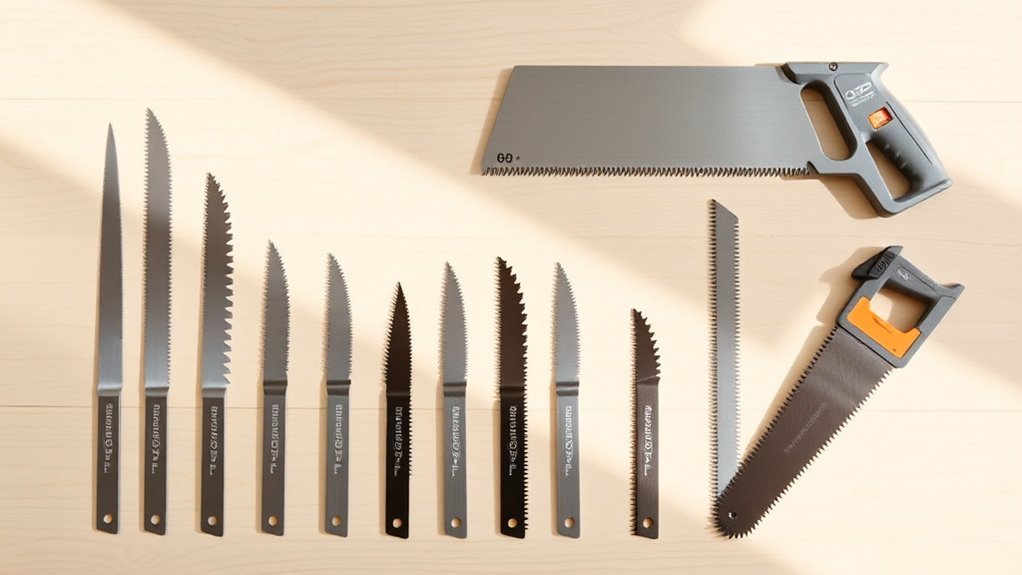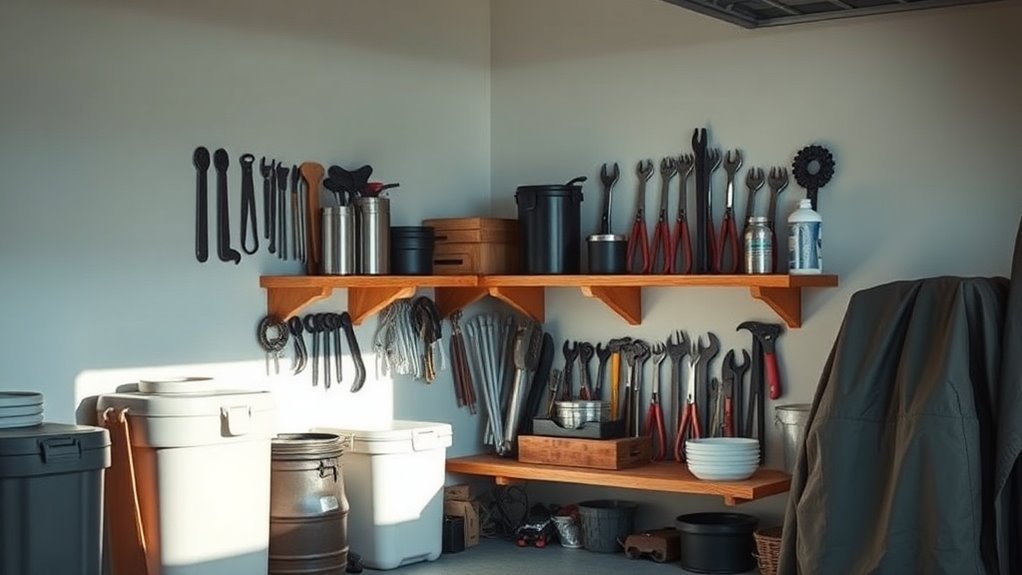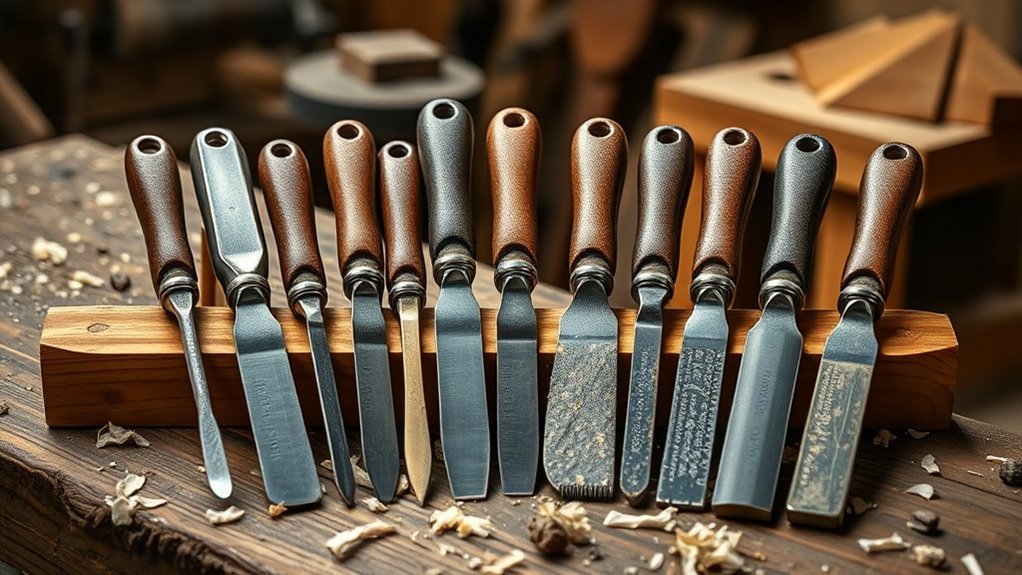When Hand Tools Are Better Than Power Tools
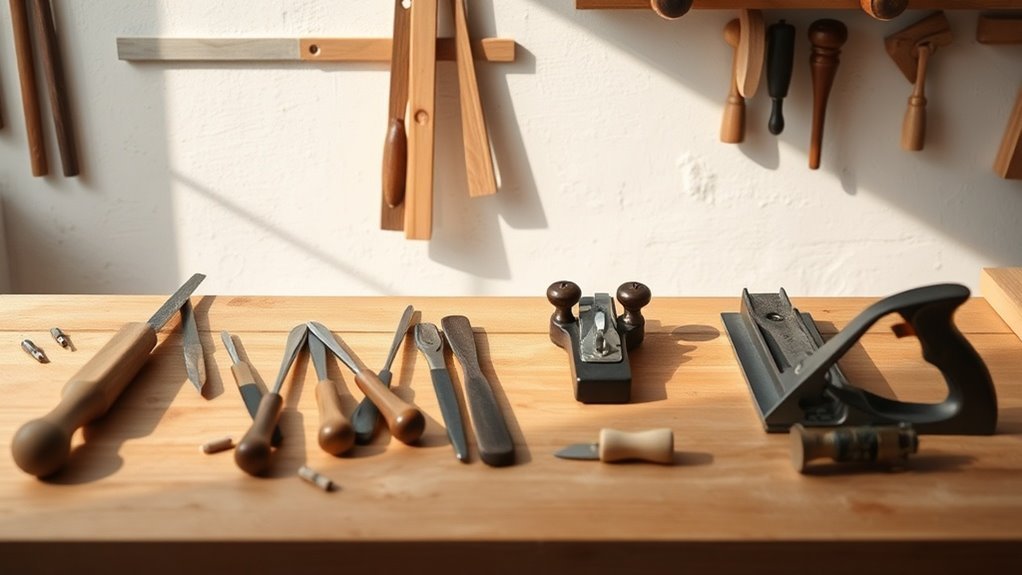
Hand tools often outperform power tools when you seek precision and control in your work. They provide a tactile connection, allowing for fine adjustments and intricate detailing. You’ll find a quieter workspace enhances your focus and reduces distractions, promoting mindfulness. Plus, hand tools are more affordable, accessible, and portable, making them easy to use anywhere. If you’re curious about how these factors can improve your craftsmanship, you might want to explore further.
Key Takeaways
- Hand tools provide greater precision and control, allowing for intricate detailing and fine adjustments in craftsmanship.
- A quiet workspace with hand tools promotes mindfulness and reduces distractions, enhancing focus and creativity during tasks.
- Hand tools are more affordable and accessible, requiring a lower initial investment and minimal maintenance compared to power tools.
- The lower speed and power of hand tools result in reduced injury risks and better control during use.
- Using hand tools minimizes environmental impact since they don’t require electricity and often use sustainable materials.
Precision and Control in Detail Work
When you’re working on detailed projects, the choice between hand tools and power tools can greatly impact your precision and control.
Hand tools offer a tactile connection to your work, allowing for nuanced adjustments that can make all the difference in fine detailing. With tools like chisels or hand saws, you’re able to execute intricate cuts without the risk of rushing through the work, which can happen with power tools.
Hand tools create a direct connection to your craft, allowing for precise adjustments and intricate cuts without the haste of power tools.
Plus, hand tools often require less physical force, meaning you’ll have better control over the pressure applied. When you’re crafting delicate features or fitting joints, the slow, deliberate action of hand tools can guarantee more accurate results. Regular maintenance and sharpening of your hand tools enhance their performance, ensuring that they remain reliable for optimal cutting efficiency during your detailed work.
Trusting that method can elevate your craftsmanship markedly.
The Benefits of Silence in Your Workspace

While many might overlook the importance of a quiet workspace, the benefits of silence can’t be underestimated. When you work in silence, your focus sharpens, allowing you to engage deeply with the task at hand.
You’ll find that without the distractions of loud machinery, your mind can explore creative solutions more freely. Silence fosters a calming atmosphere, reducing stress and promoting mental clarity, which can enhance your overall productivity.
You’ll likely notice improved satisfaction in your work, as you can better connect with the subtle nuances of your materials. Plus, this environment encourages mindfulness, helping you to work intentionally and thoughtfully.
Ultimately, embracing silence can lead to better craftsmanship and a more fulfilling woodworking experience.
Affordability and Accessibility of Hand Tools
When it comes to affordability, hand tools are often the better choice since they usually require a lower initial investment. You can easily find them at local hardware stores or online, making them accessible for anyone. If you’re just starting out or on a budget, hand tools might be the way to go. Additionally, proper tool storage techniques can enhance safety and longevity, ensuring that your tools remain in great condition.
Lower Initial Investment
Hand tools often come with a lower initial investment compared to their power counterparts, making them an accessible choice for beginners and budget-conscious DIYers alike.
When you’re just starting out, investing in a set of hand tools won’t break the bank. You can purchase essential items like screwdrivers, pliers, and wrenches for a fraction of the cost of a single power tool.
Plus, hand tools typically require minimal maintenance, saving you additional expenses. This affordability allows you to experiment with various projects without risking a big financial commitment.
As you develop your skills, you can gradually add to your collection, ensuring that each purchase fits your growing needs and budget.
Easy to Find
Finding affordable and accessible hand tools is a breeze for anyone diving into DIY projects. You can easily locate these tools at local hardware stores, online marketplaces, or even yard sales. Plus, they often come with great prices, making them perfect for budget-conscious projects. Below, you’ll find a simple comparison of popular hand tools and their typical costs.
| Tool | Average Cost | Accessibility |
|---|---|---|
| Hammer | $10 | Widely available |
| Screwdriver Set | $15 | Local stores/online |
| Wrench Set | $20 | Easy to find online |
| Tape Measure | $5 | Common at many stores |
| Handsaw | $12 | Readily found |
With these options, you’ll have no trouble gathering the tools you need!
Portability vs. Heavy Equipment
When it comes to portability, hand tools have the upper hand, making them easy to transport and store. On the other hand, heavy equipment can be a challenge due to its size and weight, which often requires additional planning for use. You’ll need to weigh the convenience of mobility against the power and efficiency of larger machinery. Additionally, having a well-equipped toolbox with essential hand tools can enhance your ability to perform routine maintenance and repairs effectively without the need for bulky equipment.
Easy Transport and Storage
Transporting and storing your tools can make a significant difference in your overall efficiency and ease of use on a project.
Hand tools often shine in this area due to their lightweight design and compact size. You can easily toss a few wrenches or chisels into your toolbox, making them simple to take along to job sites or store in a small garage.
Unlike bulky power tools, which require special storage spaces and additional care to transport, hand tools allow you to move quickly from one task to another.
Plus, you won’t have to fumble with cords, batteries, or heavy cases. This convenience can save you time and effort, helping you focus on getting the job done efficiently.
Lightweight Versus Heavy Machinery
Lightweight hand tools offer incredible portability, making them a go-to choice for many DIY enthusiasts and professionals alike. Whether you’re working in tight spaces or moving between locations, these tools can easily fit in your bag or car. Heavy machinery, while powerful, can be cumbersome and often requires a dedicated transport vehicle.
Here’s a quick comparison:
| Lightweight Tools | Heavy Machinery |
|---|---|
| Easy to transport | Requires transport |
| Ideal for small jobs | Best for large projects |
| Less storage needed | Needs significant space |
| Low maintenance costs | High maintenance costs |
When it comes to selecting your tools, think about portability versus power. Sometimes, lightweight tools are your best bet for efficiency and convenience.
The Joy of Craftsmanship and Connection to the Process
Although power tools offer speed and efficiency, the joy of craftsmanship found in hand tools lies in the immersive connection to the process.
Using hand tools allows you to engage deeply with your project, feeling the material and honing your skills. This tactile experience is fulfilling and can lead to a sense of accomplishment that power tools often miss.
Engaging with hand tools deepens your connection to the craft, offering a fulfilling tactile experience that power tools often overlook.
Here are three ways hand tools enhance your connection to craftsmanship:
- Precision: Hand tools require careful attention, increasing your craftsmanship quality.
- Control: You maintain full control over your movements, allowing for more creativity and personal expression.
- Mindfulness: The slower pace fosters a meditative state, letting you fully appreciate the art of making. Additionally, mastering the use of measuring tools can further enhance your precision and ensure craftsmanship accuracy in your projects.
Embrace this unique joy and find greater satisfaction in your work.
Safety Considerations: Hand Tools vs. Power Tools
When it comes to safety, hand tools often offer advantages like reduced accident severity and greater control over precision.
You’ll find that with hand tools, the risk of serious injuries is lower, and you’ll have more finesse in your work.
On the other hand, power tools can lead to accidents if not used properly, making safety awareness essential. Additionally, it’s crucial to wear appropriate safety gear while using power tools to minimize risks.
Reduced Accident Severity
Safety is paramount in any workshop, and understanding the reduced accident severity associated with hand tools compared to power tools can help you make informed choices.
Hand tools generally are less likely to cause severe injuries due to their lower power and speed. Here are a few key reasons why you might prefer hand tools for safety:
- Lower Force: Hand tools require physical effort, which allows for better control and reduces the risk of unexpected power release.
- Less Potential for Kickback: Unlike power tools, hand tools are less likely to kick back, which can lead to serious injuries.
- Accurate Use: With hand tools, you can focus on your task without the distraction of machinery, reducing the chance of accidents.
Choosing hand tools can greatly enhance your workshop’s safety environment.
Control Over Precision
Hand tools offer significant advantages regarding precision, largely stemming from the greater control you have over them compared to power tools. When you’re using hand tools, you can make fine adjustments easily, allowing you to achieve the exact measurements you need. This control can be essential in delicate tasks such as woodworking or metalworking.
Here’s a quick comparison of hand tools and power tools concerning precision:
| Tool Type | Control Level | Ideal Use |
|---|---|---|
| Hand Tools | High | Detailed, intricate work |
| Power Tools | Moderate | Large projects |
| Combined Use | Variable | Depends on project size |
Ultimately, when precision is key, hand tools often come out on top, letting you work with confidence and accuracy.
Maintenance and Longevity of Hand Tools
Although it might seem like hand tools require less attention than their power counterparts, proper maintenance is essential for guaranteeing their longevity and performance.
By taking a few simple steps, you can keep your hand tools in top shape for years to come.
- Clean After Use: Remove dirt, debris, and rust to prevent corrosion. A quick wipe can make a big difference.
- Sharpen Regularly: Dull blades and edges not only make work harder but can also lead to damage. Keeping them sharp improves efficiency, and regular sharpening methods ensure effectiveness.
- Store Properly: Store tools in a dry, organized space. Use toolboxes or racks to avoid damage and guarantee easy access.
Environmentally Friendly Options
As more people become aware of their environmental impact, the demand for eco-friendly tools continues to rise.
You might find hand tools to be a great option since they often require no electricity, reducing your carbon footprint and dependence on fossil fuels. Look for tools made from sustainable materials, like responsibly sourced wood or recycled metals.
Choosing these options not only supports a greener planet but can also enhance your overall crafting experience. By using hand tools, you can take pride in knowing you’re making an environmentally conscious choice.
Plus, these tools often last longer with proper care, further minimizing waste. Investing in eco-friendly hand tools is a smart move for both your projects and the environment.
Building Skills and Confidence Through Hand Tool Use
Choosing eco-friendly hand tools not only benefits the planet but also offers a unique opportunity to build your skills and confidence.
When you work with hand tools, you get to be more engaged with your project, allowing you to truly hone your abilities.
Here are three ways hand tools can help:
- Precision: Hand tools require you to focus, helping you develop eye-hand coordination and accuracy.
- Problem-Solving: You’ll encounter challenges that push you to think critically as you adapt techniques to suit your materials.
- Satisfaction: Completing tasks with hand tools can give you a sense of accomplishment that electric tools just can’t match.
Experienced crafters will tell you that the skills you gain from using hand tools stay with you for a lifetime.
The Aesthetics and Experience of Using Hand Tools
When you pick up a hand tool, you’re not just getting a job done—you’re entering a world rich with tradition and craftsmanship. Each tool tells a story, from the smooth curve of a chisel to the sturdy grip of a hand plane.
The tactile feedback you get is unmatched; holding a well-crafted tool connects you to the maker and the process. You can appreciate the aesthetics of the wood grain or the gleam of the metal, enhancing your experience.
There’s a rhythm to your movements, a meditative quality that power tools simply can’t replicate. As you work, each stroke becomes a conversation between you and the material, allowing for creativity and expression, making the task not just efficient, but deeply satisfying.
Questions
How Do Hand Tools Compare to Power Tools in Terms of Efficiency?
Hand tools often give you more control and precision, especially in tight spaces. However, power tools generally save time and reduce physical effort. It depends on the specific task and your personal preference.
What Types of Projects Are Best Suited for Hand Tools?
For detailed woodworking, precision cuts, and delicate repairs, hand tools excel. They offer control for fine craftsmanship, enhance your skills, and connect you to the material, ensuring your projects reflect your personal touch and creativity.
Are Hand Tools Safer for Beginners Than Power Tools?
Yes, hand tools are generally safer for beginners than power tools. They provide more control, reduce the risk of injury, and require less experience, allowing you to build confidence while mastering basic techniques at your own pace.
Can Hand Tools Be Just as Effective for Professional Work?
Absolutely, hand tools can be just as effective for professional work. They often provide greater precision and control, allowing you to refine your skills. Plus, they can be more versatile for various tasks and situations.
How Do I Choose the Right Hand Tool for My Needs?
Over 70% of carpenters prefer hand tools for precision. To choose the right hand tool, consider the task’s specifics, the materials you’re working with, and your personal comfort and skill level with different tools.
Conclusion
In a world buzzing with power tools, don’t underestimate the subtle strength of hand tools. They offer precision, peace, and personal connection, transforming simple tasks into treasured triumphs. Hand tools provide a path to proficiency, promoting pride in your progress. Plus, they’re often portable and environmentally friendly, making them a smart choice for skilled artisans. So, embrace the beauty and benefits of hand tools, and enjoy the satisfying sensation of crafting with care.

